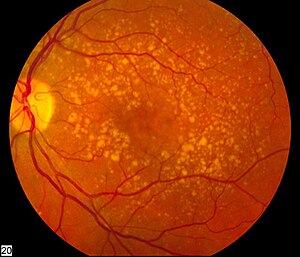A new blood test is being developed at The Australian National University (ANU) that can detect patients at risk of dry age-related macular degeneration (AMD) and potentially save millions of people from going blind.
Dry AMD is a common eye disorder that is caused by damage to the macular - the part of the eye that is responsible for our sharpest vision. It can takes years for signs of dry AMD to be found in the eye and often by the time it is diagnosed the disease is irreversible.
Lead Researcher Dr Riccardo Natoli, from The John Curtin School of Medical Research and ANU Medical School, is developing a blood test to detect the disease earlier based on a model he has developed.
Since you’re here...we have a small favor to ask. Retina Global is a nonprofit, and we have to depend on your support to sustain the work we do. Hence the need to ask for your help. Retina Global's work is important, since it not only provides help to disadvantaged people, but also provides resources for developing new treatments that can potentially cure blindness. What we do takes a lot of time, money and hard work. But we do it because we believe we have to help stop someone somewhere from going blind. So make a difference. Click here to donate. Your support is much appreciated. Thank you!
As per Dr. Natoli, the detection mechanisms we currently have for dry AMD happen too late. Once dry AMD starts, there is a threshold tipping point and once a patient gets over that point, there is nothing that can be done to save their sight. By the diagnosis stage, you look at the back of the eye and you already see that photoreceptors, the light sensing cells of the eye, are starting to die.
Researchers used a light model, thought to be the first of its kind, to better understand how the deterioration of the retina's photoreceptor cells in the macular. From their modeling, the scientists noted an inflammatory response as a consequence of the damage. They are focusing on early diagnosis and early treatment strategies that slow down the inflammatory response to see if we can slow the progression of the disease.
The ground-breaking research is backed by the Translational Fellowship Program and Beta Therapeutics that has teamed up with ANU to start testing drugs to slow the inflammatory response down.
By looking at these photoreceptor molecules in the macula (the central and important part of the retina) and understanding how they function, the scientists think they will be able to predict or diagnose a patient that is having systemic inflammatory responses. Combined with predisposition genetic information, they hope to be able to predict people who are at high risk and start treating before the disease presentation even eventuates.
Lightly edited from the source
More about Retina Global here. We seek your support. Click here to donate.


No comments:
Post a Comment
Thanks for your comments. We will get back to you shortly if there is a need to respond to it.
- Admin, Retina Global
Read more on Retina Global.